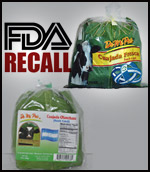That’s right; the garlic I used to make pasta with clams ,and salmon last night could have been contaminated with Listeria (but I didn’t use curd).
 Global Garlic Inc. is recalling De Mi Pais products – Cuajada Fresca (Fresh Curd) and Cuajada Olanchana (Fresh Curd) – due to possible contamination with the bacterium Listeria monocytogenes.
Global Garlic Inc. is recalling De Mi Pais products – Cuajada Fresca (Fresh Curd) and Cuajada Olanchana (Fresh Curd) – due to possible contamination with the bacterium Listeria monocytogenes.
The recall was implemented after product sampling at the manufacturing company revealed the presence of bacteria in the finished products.
Listeria monocytogenes is an organism that can cause food-borne illness in a person who consumes food item contaminated with it. Symptoms of infection may include fever, muscle aches, gastrointestinal symptoms such as nausea or diarrhea. The illness primarily impacts pregnant women and adults with weakened immune systems.
The recalled products were distributed in Florida, Louisiana, Tennessee, and North Carolina from April 1st through October 14, 2014 to distributors and retail stores. The labels of both the affected products sport the same UPC code of 896211002380 and have the Best by dates of 07/01/14 through 12/31/14.
Consumers who have purchased the products in question are requested to return it to the place of purchase for a full refund.

 can flourish.
can flourish.